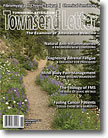Page 1, 2
Second Steps: The second level of adrenal healing involves the addition of vitamins and herbs that support adrenal function. In addition to taking a high-quality multivitamin, these three vitamins are essential for adrenal gland health:
- vitamin C
- pantothenic acid
- B-complex/B12
Vitamin C is necessary for the proper synthesis of adrenal hormones as well as pantothenic acid.1 The B-complex/B12 vitamins are cofactors in the body's main energy pathways, as well as adrenal hormone pathways, and thus they support energy metabolism as well.2,3
The next level of support involves herbal therapies. These herbs have been shown to support the adrenal gland and are considered "adaptogens," or herbs that help the body more efficiently cope with stress.4
Panax ginseng (Korean ginseng): In a well-done double-blind study, 338 individuals were given placebo or a multivitamin plus ginseng supplement. Those who received the multi plus ginseng reported significant increases in quality-of-life parameters in a population subjected to high mental and physical activity.5
Withania somnifera (Ashwagandha): Human studies on this herb are almost nonexistent; however, animal studies have shown major benefits to blood sugar, cortisol levels, and adrenal weight in animals exposed to stress while given Withania.6-8
Glycerrhiza sp. (licorice): Licorice has been a staple in adrenal formulas for centuries. It is used in both Western and Eastern formulations for its adrenal-supporting qualities. Pharmacologically, licorice has been shown to act weakly on cortisol receptors, lessening the body's burden to cortisol. In this way, licorice is cortisol sparing and can give the gland a break to rehabilitate.9
Rhodiola rosea (rhodiola): Rhodiola is another powerhouse adaptogen that has been shown to have many positive effects in individuals.
Studies on isolated tissues, cells, and enzymes have revealed that rhodiola preparations exhibit adaptogenic effects, including neuroprotective, cardioprotective, antifatigue, antidepressive, anxiolytic, lifespan-increasing effects. A number of clinical trials demonstrate that repeated administration of R. rosea extract exerts an antifatigue effect that increases mental performance (particularly the ability to concentrate in healthy subjects), and reduces burnout in patients with fatigue syndrome. Encouraging results exist for the use of rhodiola in depression and generalized anxiety.10,11
Third Steps: In severely adrenal-fatigued patients, I recommend the use of several therapies in additional to dietary, vitamin, and herbal therapies. These therapies include the use of glandulars – desiccated animal adrenal glands. These supplements contain small amounts of cortisol, which can supplement the low levels in patients. The last and most aggressive step would be to recommend prescription cortisol, or hydrocortisone. Hydrocortisone can be found at both traditional and compounding pharmacies. I recommend a dose from 5 to 15 mg per day starting with 5 to 10 mg in the a.m. and possibly an additional early-afternoon dose, if necessary.
In general, all adrenal formulas are given in the a.m., to follow the body's natural a.m. cortisol surge. A great adjunctive is to dose at night with melatonin, cortisol's nighttime hormone companion. Melatonin naturally surges and blocks the effects of cortisol during sleep.
If adrenal fatigue is the sole cause of fatigue in a patient, these strategies will greatly improve energy, brain functioning, and blood sugar. Typically, adrenal restoration is a slow process, and a patient may need to be on adrenal support for 6 months to 3 years. If under continued stress, he or she may need to consistently take adrenal-supportive supplements.
With a simple salivary adrenal hormone test, we can detect adrenal issues in our patients. Patients feel great relief when they begin to understand that there is a biochemical reason for their fatigue and that it can be effectively treated.

Notes
1. Amano A, Tsunoda M, Aigaki T, Maruyama N, Ishigmi A. Effect of ascorbic acid deficiency on catecholamine synthesis in adrenal glands of SMP30/GNL knockout mice. Eur J Nutr. 2013 Mar 19.
2. Jaroenporn S, Yamamoto T, Itabashi A, et al. Effects of pantothenic acid supplementation on adrenal steroid secretion from male rats. Biol Phar Bull. 2008 Jun;31(6):1205–1208.
3. James SP, Golden RN, Sack DA. Vitamin B12 deficiency and the dexamethasone suppression test. J Nerv Ment Dis. 1986 Sep;174(9):560–561.
4. Kelly GS. Nutritional and botanical interventions to assist with the adaptation to stress. Altern Med Rev. 1999 Aug;4(4):249–265.
5. Caso Marasco A, Vargas Ruiz R, Salas Villagomez A, Begoña Infante C. Double-blind study of a multivitamin complex supplemented with ginseng extract. Drugs Exp Clin Res. 1996;22(6):323–329.
6. Archana R, Namasivayam A. Antistressor effect of Withania somnifera. J Ethnopharmacol. 1999;64:91–93.
7. Dhuley JN. Effect of ashwagandha on lipid peroxidation in stress-induced animals. J Ethnopharmacol. 1998;60:173–178.
8. Elsakka M, Pavelescu M, Grigorescu E. Withania somnifera, a plant with a great therapeutical future. Rev Med Chir Soc Med Nat Iasi. 1989;93:349–350.
9. Armanini D, Karbowiak I, Funder J. Affinity of licorice derivatives for mineralocorticoid and glucocorticoid receptors. Clin Endocrinol. 1983;19:609–612.
10. Noreen EE, Buckley JG, Lewis SL, Brandauer J, Stuempfle KJ. The effects of an acute dose of Rhodiola rosea on endurance exercise performance. J Strength Cond Res. 2013 Mar;27(3):839–847.
11. Panossian A, Wikman G, Sarris J. Rosenroot (Rhodiola rosea): traditional use, chemical composition, pharmacology and clinical efficacy. Phytomedicine. 2010 Jun;17(7):481–493.
 Dr. Amy Terlisner attended the University of Georgia in Athens, Georgia, where she obtained a BS in holistic medicine, a degree that she customized for her later studies in naturopathic medicine. She graduated summa cum laude (with highest honor) and published an undergraduate thesis in health psychology. Dr. Terlisner then attended Bastyr University in Seattle, Washington. She has an extensive teaching background and has taught physiology, anatomy, clinical laboratory diagnosis, pharmacognosy, physical exam diagnosis, and manipulation at the doctorate level. Her specialties include women's health, cardiovascular disease, gastroenterology, anti-aging medicine, and natural hormone replacement therapy. Dr. Terlisner is the current president of the Arizona Association of Naturopathic Physicians and owns ALETRIS Center of Integrative Medicine, located in Scottsdale, Arizona. Dr. Amy Terlisner attended the University of Georgia in Athens, Georgia, where she obtained a BS in holistic medicine, a degree that she customized for her later studies in naturopathic medicine. She graduated summa cum laude (with highest honor) and published an undergraduate thesis in health psychology. Dr. Terlisner then attended Bastyr University in Seattle, Washington. She has an extensive teaching background and has taught physiology, anatomy, clinical laboratory diagnosis, pharmacognosy, physical exam diagnosis, and manipulation at the doctorate level. Her specialties include women's health, cardiovascular disease, gastroenterology, anti-aging medicine, and natural hormone replacement therapy. Dr. Terlisner is the current president of the Arizona Association of Naturopathic Physicians and owns ALETRIS Center of Integrative Medicine, located in Scottsdale, Arizona.
Page 1, 2 |
![]()
![]()
![]()





 Dr. Amy Terlisner attended the University of Georgia in Athens, Georgia, where she obtained a BS in holistic medicine, a degree that she customized for her later studies in naturopathic medicine. She graduated summa cum laude (with highest honor) and published an undergraduate thesis in health psychology. Dr. Terlisner then attended Bastyr University in Seattle, Washington. She has an extensive teaching background and has taught physiology, anatomy, clinical laboratory diagnosis, pharmacognosy, physical exam diagnosis, and manipulation at the doctorate level. Her specialties include women's health, cardiovascular disease, gastroenterology, anti-aging medicine, and natural hormone replacement therapy. Dr. Terlisner is the current president of the Arizona Association of Naturopathic Physicians and owns ALETRIS Center of Integrative Medicine, located in Scottsdale, Arizona.
Dr. Amy Terlisner attended the University of Georgia in Athens, Georgia, where she obtained a BS in holistic medicine, a degree that she customized for her later studies in naturopathic medicine. She graduated summa cum laude (with highest honor) and published an undergraduate thesis in health psychology. Dr. Terlisner then attended Bastyr University in Seattle, Washington. She has an extensive teaching background and has taught physiology, anatomy, clinical laboratory diagnosis, pharmacognosy, physical exam diagnosis, and manipulation at the doctorate level. Her specialties include women's health, cardiovascular disease, gastroenterology, anti-aging medicine, and natural hormone replacement therapy. Dr. Terlisner is the current president of the Arizona Association of Naturopathic Physicians and owns ALETRIS Center of Integrative Medicine, located in Scottsdale, Arizona.